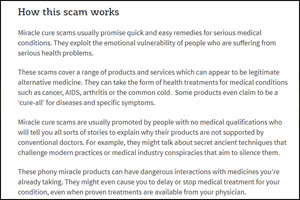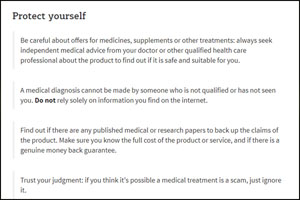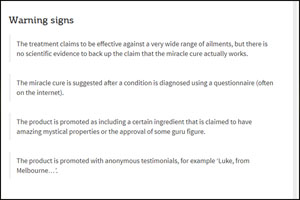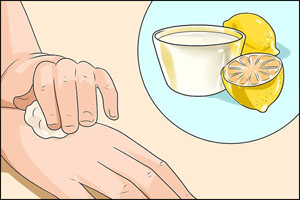Cure All Products Scams
Caution:
Beware of offers which claim that
-
Emails that claim a particular product is a "miracle cure," a "scientific breakthrough," an "ancient remedy," or a quick and effective cure for various diseases are common.
These emails generally announce that a very limited offer is available, require payment in advance, and promise a no-risk "money-back guarantee."
Specific case histories or testimonials from consumers or doctors claiming amazing results are not uncommon.

Feel Free to use our Spam Checker Tool
We are providing the Spam Checker Tool for your convenience. Here, you can enter the email or contact number that you suspect to be a scam. This tool checks it against our spam database and confirms whether the email or phone number is legitimate or bogus.
You can report scams to the United States government—you may file a complaint about a scam or other crime here.
Miracle products are sold in many stores, often promising to deliver wonders. But the question is: are these products really worth it? Or is this just another scam niche that innocent people are falling prey to? We have come across numerous telemarketing ads that promise to cure life’s problems—ranging from hair fall to reducing belly fat, and more. The ultimate strategy of scammers is to target innocent users emotionally. The constant repetition of phrases claiming to "cure all problems" in phone calls or ads triggers a buying instinct in customers. Scammers exploit this by trying to sell so-called miracle products, which in reality do nothing miraculous—except generate huge profits for the scammer.

Miracle cure scam explained in detail
The miracle cure scam operates by exploiting the victim's vulnerability to illness. The more serious or emotionally distressing the disease, the higher the chances that the victim will fall for the scam. The most common conditions that are falsely promised to be cured include cancer, insomnia, diabetes, weight loss, baldness, memory loss, heart disease, Alzheimer's, and sexual performance issues. These scams are often advertised online or through spam emails. Websites selling such medicines usually include a testimonials section filled with positive reviews and high ratings from supposed previous customers. In reality, these individuals likely never used the product. Alongside the testimonials, scammers often provide fake details about clinical trials and testing methodologies to convince victims of the product’s authenticity.

Some scam websites may sell what appear to be established prescription medicines, which you may recognize or have been prescribed by your doctor previously. However, these medicines may not contain the same ingredients. Such products not only differ from the real ones but are also a waste of money and may cause harm if consumed. These sites may even recommend that you stop any medical treatment prescribed by your healthcare professional. Every year, hundreds of thousands of people fall victim to miracle cure scams that promise to cure severe conditions.
Websites offering scam health products often include a “no-risk” money-back guarantee. However, when you try to contact them due to dissatisfaction with the medicine, the scammers disappear. These products are typically promoted by individuals with no proper medical qualifications, and they attempt to convince you to buy their fake medicines by claiming they are made using ancient techniques that outperform modern medical practices.
How to recognize medical frauds and scams?
-
The miracle cure is suggested after a condition is diagnosed using a survey conducted on the internet.
Testimonials on their websites are from customers who do not exist or have never actually purchased the product.
They offer a money-back guarantee without any risk.
Promotion of the product focuses on a certain ingredient that supposedly has mystical properties.
The treatment claims to be effective against a very wide range of ailments, but there is no scientific evidence to support the claim that the miracle cure actually works.
Scammers often use statements like "The pharmaceutical industry and government are trying to hide information about a miracle cure" to divert attention from logical, product-related questions. Needless to say, these statements are untrue and unfounded.
To prompt customers to act quickly, they add a "limited period" offer.
Protect yourself against miracle cure scams:
- Firstly, never open a mail with subjects like "Miracle cure", "scientific breakthrough", "ancient remedy", "all natural", "secret ingredient" etc.
- Be skeptical about any mails with grammatical errors and poor spelling.
- Consult your doctor for any health related concerns.
- Before buying a medicine online, verify with your qualified health professional about its effects and to find if it is safe and suitable for you. Do not rely on the information you find over the internet.
- Do not get carried away by the testimonials and references you come across online. They are mostly from fake customers.
- If it claims to be using a certain ingredient that will cure your disease, study about the drug in research papers having case studies.
- Carefully read terms and conditions section. If the product is cheap or if they offer anything for free, it usually contains additional hidden costs.
- Check your medical bills in detail for proper drug name(s), amount, tax rate, quantity and total.
- Go with your instinct. If you think the medical treatment is a scam, delete it right away.


Common forms of miracle cure scam:
1. CURE-ALL HAIR LOSS SCAM
2. DIABETES FREE SCAM



